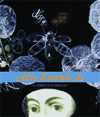Book Review
 Much has been written on the subject of identity politics; by contrast, relatively little has been written concerning the field of identity poetics. Elizabeth Robinson’s latest book, Also Known As, explores this largely uncharted territory, taking up questions of identity and authorship as its premise and complicating them via the introduction of numerous heteronyms.
Much has been written on the subject of identity politics; by contrast, relatively little has been written concerning the field of identity poetics. Elizabeth Robinson’s latest book, Also Known As, explores this largely uncharted territory, taking up questions of identity and authorship as its premise and complicating them via the introduction of numerous heteronyms.
Heteronyms—imagined poetic personae—are the invention of the Portuguese poet Fernando Pessoa, and Robinson both furthers and subverts his project by writing under the guise of Pessoa, a poet already assuming multiple (sometimes opposing, sometimes parallel, always interacting) personalities. With regard to each identity, Robinson invites us “to see the dander of the person who once / lived inside,” asking us to consider each as a whole human being on the page, complete with idiosyncratic turns of phrase, verbal tics, and unique conceits.
Robinson’s personae speak in markedly different styles; her/their language and tone(s) range from the scientific and detached to the emotionally charged lyric of religious fervor. In the poem “Static Electricity,” emblematic of the former, she writes:
We tried to measure friction as a form of space,
(the collaboration between area
and abode)
on the arcing currents that
cross or X
commanded
together:
two hallways make amends to their angles:
captivated voltage.
The poet’s vocabulary and her use of the page give rise to a supervening persona, one that differs dramatically from that in the poem “Beggar.” Here, the identity favors the spiritual and the visceral over the intellectual:
Any day now I expect you to rise off the dirty cot
I’ve imagined for you. Lazarus, my beloved,
whose name I’ve surmised, whose genesis falls
before my sad stutter as my voice lifts you
with its mistaken hand, crying, “Get up, Lucifer!”
The reader feels pulled into a metafictional masquerade in which authors disguised as authors are writing as still other authors; one can’t help but think of Mark Danielewski’s novel House of Leaves, a book that—if it can be summarized—comes to us as the edited annotations of a potentially fictional documentary transcript concerning a supernatural house. In Robinson’s work, one gets the same sense that there are circles within circles within circles; or, as Fernando Pessoa wrote in his poem “Autopsychography,” “The poet is a man who feigns / And feigns so thoroughly, at last / He manages to feign as pain / The pain he really feels.” We find that one identity’s fiction is another’s reality.
While the inventiveness of Robinson’s poems gives her collection several unique and colorful personae, some stock characters also make an appearance in Also Known As: the “bride and bridegroom” (“Perfunctory Color”), “the clown, the harlequin” (“Confession”). Although their presence helps ground Robinson’s work more firmly in the casts of characters and alternate identities with which readers of poetry are generally familiar, one can’t help but feel that their inherent ambiguity, their roles as blanks to be filled, causes them to pale in comparison to the personalities that see their faces “before the bathroom mirror, ringed / with the clock’s circle of hands and hands” (“Transparent”). Somehow, we as readers identify more strongly with these anonymous heteronyms than with any bride or clown with a longer and more varied literary history.
In an age when identity theft and the appropriation of personae via the Internet run rampant, Elizabeth Robinson’s poems are surprisingly timely. Janus-like, they manage to attend to our oldest and newest questions and fears, simultaneously looking back at philosophical questions of identity that have long concerned mankind, as well as more modern quandaries pertaining to literary collaboration and appropriation. Are we the same people we were yesterday? How much can we borrow from another’s work before it’s stealing? If all writing is collage, then isn’t all writing plagiarism? Can we plagiarize ourselves?
“I knew air was a collage,” Robinson writes in “a deeper breathing with other lungs,” and that “I wanted / this endlessness, someone else’s air pinned to / my own breath.” Like this persona, the reader wants to be involved in the text, the conversation between Robinson’s fictions and Robinson, and Pessoa’s fictions and Pessoa, all at once. Robinson’s affinity for disguises speaks to our own affinity for disguises—to the human affinity for disguises—and her poems do not disappoint us in this regard. Like Janus, they draw their power from their ability to consider multiple viewpoints and present multiple aspects at once. And, like Janus, they require more than one face, more than one mask, to do it.
About the Reviewer
Eric Weinstein's poems have appeared or are forthcoming in Black Warrior Review, Colorado Review, Indiana Review, Prairie Schooner, and Salt Hill. His collection, Vivisection, won the 2010 DIAGRAM/New Michigan Press chapbook competition. He lives in New York City.